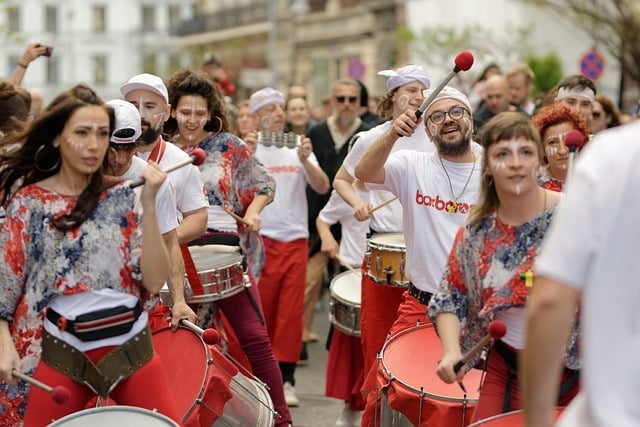Successful event planning for local businesses is a multifaceted process that hinges on meaningful community engagement and leveraging indigenous resources to create authentic, impactful events. These events thrive when local businesses, members, and talents are integrated into the planning and execution, fostering a sense of ownership and alignment with the community's interests. Strategic partnerships with local entities for sponsorships, joint promotions, and venue usage not only support local commerce but also enhance the overall experience for attendees. A targeted approach using market research and demographic data ensures that content, themes, and activities resonate with the local audience, promoting a sense of belonging and pride in the neighborhood's cultural heritage. Event planning must also be meticulously budgeted, with funds allocated across essential areas like venue, catering, marketing, entertainment, and technology, while anticipating unforeseen costs. By capitalizing on local venues and resources, events can directly contribute to the community's economic health and sustainable growth. Effective post-event analysis involving data analytics and feedback collection is key to understanding audience preferences and refining event strategies for continuous improvement in Event Planning for Local Businesses.
Local event planning thrives on the synergy of community engagement and strategic coordination. This article delves into the nuances of crafting successful local events, from target audience identification to budget-conscious resource utilization. Businesses will gain insights into leveraging community ties, tailoring experiences to local needs, implementing effective budgeting strategies, and harnessing available resources and venues for maximum impact. Key performance indicators and feedback mechanisms are also explored to measure the success of these events, ensuring that event planning for local businesses is both impactful and sustainable. By mastering local business event planning, organizations can create memorable experiences that foster stronger connections within the community while driving brand loyalty. Building partnerships with local vendors and stakeholders further enhances the authenticity and relevance of these events, making them more appealing to the target audience. With a focus on innovation and adaptability, businesses can continue to refine their event planning strategies to meet changing community dynamics and expectations.
- Leveraging Community Engagement for Effective Event Planning
- Identifying Target Audiences and Tailoring Events to Local Needs
- Budgeting Strategies for Local Businesses' Events
- Utilizing Local Resources and Venues for Maximized Impact
- Measuring Success: Analytics and Feedback in Local Event Planning
Leveraging Community Engagement for Effective Event Planning

The success of local events often hinges on the depth of community engagement, a critical component in event planning for local businesses. By actively involving community members in the planning and execution process, organizers can create a more authentic and meaningful experience that resonates with attendees. This not only fosters a sense of ownership among participants but also ensures that the event aligns with the interests and character of the locality. Engaging with local businesses themselves is equally important; they can provide invaluable insights into the community’s preferences and facilitate partnerships that enrich the event. These collaborations can take various forms, such as sponsorships, joint promotions, or providing venues, all of which contribute to a well-rounded event that supports local commerce and enhances the overall experience for everyone involved.
Furthermore, effective event planning for local businesses requires leveraging local assets, including talent, resources, and networks. Community members can serve as volunteers, ambassadors, or even performers, adding a personal touch to the event. Utilizing local venues not only adds character but also reduces costs associated with renting spaces. Local businesses can act as hubs for ticket sales, information centers, and even vendors, creating a symbiotic relationship where the event and the business benefit mutually from increased exposure and foot traffic. By integrating these elements thoughtfully, local events become more than just gatherings; they become landmarks that celebrate the community’s identity and contribute to its vibrancy. This strategic engagement not only enhances the event but also strengthens community ties and positions local businesses as integral partners in creating memorable experiences for all.
Identifying Target Audiences and Tailoring Events to Local Needs

Effective event planning for local businesses is a nuanced process that hinges on the ability to identify and understand target audiences. Successful events are those that resonate with attendees, offering them experiences that reflect their interests and cater to their unique needs. By conducting market research and analyzing demographic data, planners can pinpoint the specific audience segments most likely to engage with an event. This targeted approach ensures that the event’s content, themes, and activities are tailored to resonate with these individuals, thereby maximizing relevance and appeal. For instance, a local business looking to host a community fair should consider the preferences and interests of residents within the immediate area. This might involve showcasing local vendors, artists, and performers who align with the tastes and cultural nuances of the neighborhood. By doing so, the event not only attracts the desired audience but also fosters a sense of community and local pride, which can translate into ongoing support for local businesses.
Tailoring events to local needs is an integral part of event planning for local businesses. It involves assessing the specific social, cultural, and economic dynamics of the region. Understanding these elements allows planners to craft events that are not only well-received but also contribute positively to the local economy. For example, integrating themes that reflect the area’s history or hosting workshops that address the unique challenges faced by local entrepreneurs can significantly enhance the event’s value proposition. Additionally, aligning with local businesses as partners or sponsors ensures that the event not only supports local commerce but also reinforces community ties and collaboration. This strategic approach to event planning not only drives engagement and attendance but also establishes a foundation for sustained economic vitality within the community.
Budgeting Strategies for Local Businesses' Events

When local businesses aim to host successful events, meticulous budgeting is a cornerstone of event planning. Crafting a budget that accurately reflects the scale and scope of an event requires a strategic approach. Entrepreneurs must first identify the purpose of their event, whether it’s to launch a product, celebrate a milestone, or engage with the community. This clear objective guides the allocation of funds to various components such as venue rental, catering, marketing, entertainment, and technology needs like audio-visual equipment and event management software.
A robust budgeting strategy includes setting aside contingency funds for unexpected expenses, which is crucial in the dynamic environment of event planning. Local businesses should also consider leveraging sponsorships or partnerships to offset costs. This not only lightens the financial burden but can also enhance the event’s appeal by bringing additional resources and networks into play. Furthermore, tracking expenditures in real-time allows for adjustments on the fly, ensuring that the event remains within budget while still delivering an impactful experience for attendees. By adopting a detailed and flexible budgeting strategy, local businesses can successfully plan and execute events that achieve their goals and leave a lasting impression on participants.
Utilizing Local Resources and Venues for Maximized Impact

Local event planning that leverages indigenous resources and venues can significantly amplify community engagement and economic impact for local businesses. By tapping into underutilized local spaces, organizers can transform familiar environments into unique settings for events, offering attendees a novel experience that supports the local economy. Strategic use of these venues ensures that funds are circulated within the community, directly benefiting local vendors, service providers, and small businesses. This not only fosters a vibrant event but also contributes to the sustainable growth and vitality of the region.
Furthermore, when local resources are the backdrop for an event, there is an inherent sense of authenticity and pride that resonates with participants. Local artists, entertainers, and artisans can be showcased, providing a platform to exhibit their talents and crafts. This approach not only adds cultural richness but also encourages attendees to explore and patronize local businesses beyond the event itself. By integrating local resources into the fabric of event planning for local businesses, organizers create an immersive and enriching experience that strengthens community bonds and supports the local economy in a tangible way.
Measuring Success: Analytics and Feedback in Local Event Planning

Effective event planning for local businesses hinges on the ability to measure success accurately. This involves a strategic application of analytics and the careful collection of feedback from attendees, organizers, and stakeholders. By leveraging data analytics, planners can track key performance indicators (KPIs) such as attendee demographics, engagement rates, and return on investment (ROI). These insights enable businesses to tailor events to their target audience, optimize event marketing strategies, and streamline operations for maximum efficiency. Additionally, post-event surveys and feedback tools provide a direct line of communication with participants, offering valuable qualitative data that can highlight strengths and pinpoint areas for improvement. This two-pronged approach of quantitative and qualitative analysis ensures that local events are not only well-attended but also resonate with attendees, fostering a sense of community and loyalty to the hosting businesses.
Furthermore, integrating technology into event planning enhances the ability to capture data in real-time. Digital registration systems, mobile apps for attendees, and social media integration are all tools that can facilitate the collection of both real-time analytics and feedback during the event. This immediate access to information allows organizers to make on-the-spot adjustments to enhance the attendee experience or respond to unforeseen circumstances. By marrying these advanced technologies with a keen understanding of the local market, businesses can elevate their events from mere gatherings to significant opportunities for brand growth and customer engagement. The strategic use of analytics and feedback is thus indispensable in event planning for local businesses, ensuring that each event not only meets but exceeds expectations.
Effective event planning is a cornerstone for local businesses seeking to engage their communities and enhance their visibility. This article has outlined key strategies, from targeting local audiences and tailoring events to fit their needs, to crafting budgets that reflect the unique financial landscape of small-scale ventures. By leveraging available local resources and venues, these businesses can create impactful experiences that resonate with attendees. Moreover, incorporating analytics and feedback into the planning process ensures that events not only meet but exceed expectations, laying a foundation for future success. In conclusion, event planning for local businesses is an intricate yet rewarding endeavor when approached with a community-centric mindset, careful budgeting, and a commitment to continuous improvement based on audience insights.
